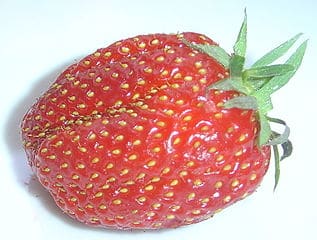University of Florida scientists believe they have pinpointed the exact compounds in strawberries that give the fruit its delightfully unique flavor – findings that will allow UF breeders to create more flavorful varieties even faster.
What’s more, the researchers believe that eventually, those naturally occurring compounds will be used to make processed foods taste sweeter, using far less sugar and no artificial sweeteners. And if fruits and vegetables taste better, people will be more likely to eat them, the researchers say.
After looking at 35 strawberry varieties over two growing seasons, conducting extensive biochemical testing and hosting consumer taste panels, they identified 30 compounds directly tied to strawberry flavors that consumers adore.
And they also identified six volatile compounds that add to humans’ perception of sweetness in the fruit – independent of any type of sugar contained in the fruit.
Those six volatiles add to the growing portfolio of sugar-independent, flavor-enhancing compounds found in fruits, vegetables and herbs that UF Institute of Food and Agricultural Sciences researchers are zeroing in on.
The researchers are part of the Plant Innovation Program, a group of about 45 UF/IFAS scientists conducting research in plant science and human sensory analysis, with a goal of helping people live and eat more healthfully.
The team’s recent work was outlined in a paper published online by PLoS One Feb. 11.
Thomas Colquhoun, an assistant professor in environmental horticulture, said the group has a full pipeline of research projects and expects similar findings in the next few years for important Florida crops such as blueberries, peaches and various herbs.
“You can envision that every time we’re looking at a crop, we’re getting a new, exciting chance to be able to add one little piece to that flavor puzzle,” Colquhoun said. “So we’re just running right down the list of Florida-important crops, and we’re picking up different aspects of the flavor sensation itself, in each one.”
Michael Schwieterman, a postdoctoral researcher and the paper’s lead author, said the six sugar-independent volatiles are some of the group’s top “targets of interest.”
While the ability to corral those volatiles and use them to make more flavorful, less-sugar-enhanced foods may be in the future, he said the group’s traditional plant breeders are using the findings to create consumer-preferred flavors now.
The latest study also looked at seasonality – or changes in the berries’ chemical makeup depending on where it is in the growing season – so UF/IFAS plant breeders can now use the information to select plants that keep premium flavor throughout the season, he said.
“So when we find these specific volatiles, it will help us produce cultivars that we know have a good chemical profile and should be perceived as much sweeter, with better flavor,” Schwieterman said.
The research was supported by a U.S. Department of Agriculture specialty crop block grant. Besides Schwieterman and Colquhoun, the UF/IFAS team included Linda Bartoshuk, an endowed professor in food science and human nutrition; Kevin Folta, horticultural sciences chairman; Harry Klee, an eminent scholar and endowed professor in horticultural sciences; Charles Sims, a professor in food science and human nutrition; Vance Whitaker, an assistant professor in horticultural sciences; David Clark, a professor in environmental horticulture and the Plant Innovation Program director; Howard Moskowitz, courtesy faculty in food science and human nutrition; and former College of Agricultural and Life Sciences undergraduate student Elizabeth Jaworski.



The idea of sweeter, longer lasting strawberrys is marvellous to the ears of organisations seeking to sell strawberrys on their shelves for longer without the fruit rotting or to those that seek to mimic the delicious taste of real strawberrys in foods such as yoghurt or flavoured milk, but what about those who fear the ever growing beast that is GM foods?
The advantages of genetically modified foods is most definitely a long list ranging from pest resistance to more flavourful or nutricious foods, but what about the disadvantages like the morality behind the idea or the fact that with each bite of an unnaturally large and sweet strawberry is a bite of hormones and chemicals that should not be in there.
I, for one, have no argument against foods and fruits that will help save starving children in Africa or reduce the alarming rate of malnutrition amongst the poor in India. My only concern is whether or not the fruit we are feeding these innocent people might end up causing more harm that good.
14004985
This is excellent!